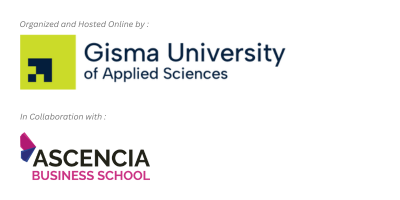|
|
|
|
Call for Communication Gisma University of Applied Sciences (Germany) in collaboration with Ascencia Business School (France) are pleased to announce the 2025 edition of STIM conference on: Sustainable Technologies & Innovation in Management
Impacts of AI Innovation & Sustainability Trade-Offs On the 5th of December 2025 ONLINE (hosted via Gisma’s Innovation Campus in Potsdam - Germany)
As global economies advance toward innovative digitalization and sustainability, Artificial Intelligence (AI) stands at the intersection of both transformations. The 2025 edition of STIM (Sustainable Technologies and Innovation in Management) aims to further explore this intersection. STIM 2025 will be a platform to debate and rethink the boundaries of technological progress in management. By focusing on AI’s transformational role in innovation and its sustainability paradox, we aim to stimulate actionable insights and responsible strategies for future-forward organizations. We invite scholars, professionals, innovators, and students to join us in examining how AI is reshaping innovation in management, influencing sustainability trajectories, and challenging conventional models of growth and responsibility Context Overview In the past few years, many organizations have been adopting sustainable technologies, such as digital platforms, green process innovations, and Industry 4.0 tools, etc. Their aims are not only for efficiency, but to also better align with environmental and social responsibilities. These transformations are enabled by strong leadership, digital capabilities, and innovative ecosystems that aim for long-term, inclusive growth. AI today is no longer a supporting tool: it is a core driver of innovation. It operates as both originator and facilitator in the innovation lifecycle, reshaping ideation, development, and organizational roles. Also, generative AI is pushing boundaries of creativity and efficiency while introducing new competencies and ethical dilemmas. Beyond AI, a wide array of emerging technologies - including blockchain, Internet of Things (IoT), augmented reality (AR), and advanced analytics - are reshaping management practices, marketing strategies, and innovation systems. These tools enhance transparency, personalize customer experiences, optimize resource flows, and enable data-driven decision-making. When combined with AI, they generate synergistic effects that redefine how value is created and delivered across industries. On the other hand, while AI contributes to energy optimization, smart resource use, and achieving Sustainable Development Goals, its own carbon footprint and social risks (e.g., bias, inequality, resource use) complicate its role as a sustainable technology. This duality demands a deeper inquiry into Green AI, ethical regulation, and the long-term viability of AI-centric systems. This conference brings together professionals, academics, and students to explore sustainable technologies, innovation, and AI in driving responsible progress. Join us online to shape the future of innovation and sustainability !
Themes (Non-Exhaustive)
Target Participants
Bibliography Ameer, R., & Othman, R. (2012). Sustainability Practices and Corporate Financial Performance: A Study Based on the Top Global Corporations. Journal of Business Ethics, 108, 61-79. https://doi.org/10.1007/s10551-011-1063-y |
Important Dates Submission Deadline: Notification of Acceptance: Conference Dates:
Submission Guidelines Submissions of communication proposals are now open for research papers, case studies, innovative project reports, or any relevant scholarly or professional contributions that align with the conference themes. Proposals must be submitted before the deadline in the form of a summary or abstract (up to 1,000 words in English) clearly outlining the research objectives, methodology, and key findings (or expected results). Accepted proposals will be allocated a 15-minute presentation slot, followed by 5 minutes of Q&A with the audience. * Submissions can be made only via this platform. To do so, log in using your SciencesConf, HAL, or CCSD account by clicking the “Login” button at the top right of the page. If you do not have an account, click the small arrow next to “Login” to open the dropdown menu, then select “Create account.” Once logged in, go to the “Submit Abstract” tab in the menu and follow the steps.
Publication Opportunity Participants will be invited to submit the revised full-paper of their presented communication for peer-review and potential publication within the Conference Proceedings in the Scopus-indexed IEEE Xplore. Alternative publication options in a special issue at one of our associated partner journals will also be proposed later. The scope, novelty, standards, and similarity index will be carefully evaluated before notifying authors of the outcome.
Participation & Publication Fees Participation in the STIM 2025 conference is free of charge. There are no fees for applying, presenting, or attending the conference. Optional post-conference submission of the full paper may incur processing fees upon acceptance for publication, depending on the chosen publication route. |


